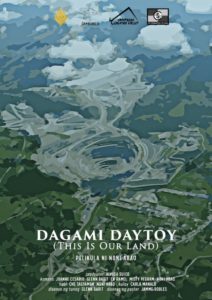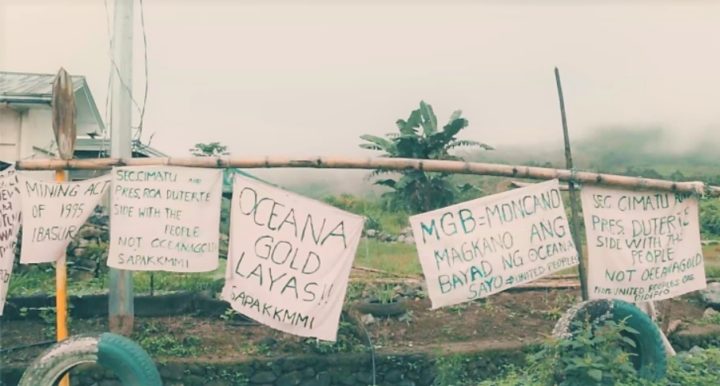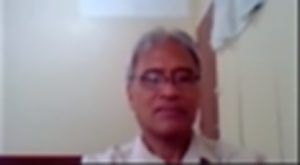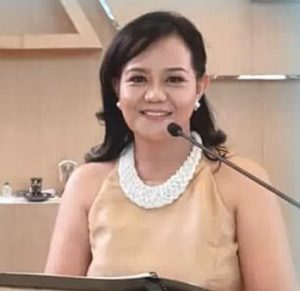SPECIAL FEATURE
By Genevieve Balance Kupang
 Dagami Daytoy exposed the problems experienced by the locals due to the impact of the Didipio Mine in Nueva Viscaya, Philippines. Documentary Film Credit: Noni Abao
Dagami Daytoy exposed the problems experienced by the locals due to the impact of the Didipio Mine in Nueva Viscaya, Philippines. Documentary Film Credit: Noni Abao
“Ecosystem Restoration” is this year’s theme for the UN World Environment Day (WED). Pakistan in partnership with the UN Environment Programme (UNEP) hosted the 2021 WED. This year (the second year of the Covid 19 pandemic), jumpstarts the UN Decade (2021-2030) of Ecosystem Restoration, a measure exhorting stakeholders to be ingenious and resourceful in restoring what had been annihilated, and destroyed by untenable damaging large-scale extractive industries, illegal logging, dynamite and over-fishing, irresponsible disposals of hazardous wastes, harmful use of toxic chemicals for agriculture, industries and informal sectors, among other human unsound environmental activities. Ecosystem Restoration can only be possible if actors Stop Environmental Plunder (SEP). Pillagers are urged to SEP and join all concerned global citizens to Start Environmental Restoration (SER). SEPSER then is an apt move if we are to work with the United Nations, Church-based organizations, government agencies, NGOs, and civic movements for the healing and restoration of Mother Earth for the present and future generations.
Lingap-Canada Spearheads the WED Celebration
The Learning for Interdependence and Global Awareness of the Philippines-Canada (Lingap-Canada) celebrated the World Environment Day last June 5 (Edmonton MDT), and June 6, 2021 (Philippine time). It kicked off with a video reflection of the song “Masdan Mo Ang Kapaligiran” by Asin, a Filipino folk-rock band. The first event highlight was the showing of a documentary film Dagami Daytoy (This is Our land) directed by Noni Abao, a human rights worker who toiled in the Cagayan Valley Region where he made short documentaries.
Dagami Daytoy exposes the story of the Indigenous Peoples’s campaign against mining by OceanaGold Corporation [OceanaGold or OceanaGold (Philippines), Inc. or OGPI], an Australian-Canadian corporation which started to operate in 1994 on their ancestral lands in Didipio, Kasibu, Nueva Vizcaya, Philippines. The Provincial Governor, local governmental units (LGU), Church leaders, academe, NGOs, and like-minded citizens have joined the campaign appealing to the National Government NOT to renew the agreement for the mining. The documentary is truly relevant for commemorating World Environment Day and for motivating Filipino Canadians and other Canadians to be in solidarity with the campaign of Indigenous Peoples and other Filipinos seeking environmental justice and building a sustainable society. Aside from the non-renewal of the Financial and Technical Assistance Agreement (FTAA) between the OceanaGold and the Philippines, concerned citizens demand also that OceanaGold make way for the restoration of ecosystems ravaged at the mining site.
The documentary film won 2nd prize in the 2020 Yale Environment 360 Video Contest and the Grand Prize in the 2020 Gawad Cultural Center of the Philippines Para sa Alternatibong Pelikula at Video (for Alternative Film & Video).
Forum on the Mining Issues of Didipio, Kasibu, Nueva Viscaya, Philippines

Expressions of exhortation from the people urging OceanaGold to leave the place and for President Duterte to side with the peoples of Didipio and not OceanaGold. Credit: Noni Abao
Ecosystem Restoration can only be possible if stakeholders STOP the plunder of the environment like the harmful and destructive operations of mining. So, another highlight of the event was the addresses given by the resource persons Rev. Fr. Vicente Tiam and Ms. Heather McPherson, MP during the forum. Fr. Tiam is the chairperson of the Alyansa ng Novo Vizcayano para sa Kalikasan (ANVIK) [Alliance of Nueva Vizcayans for the Environment] Nueva Vizcaya, Philippines while Ms. McPherson is a Member of Parliament for Edmonton Strathcona, Canada.
 Fr. Vicente Tiam, Chair of the Alyansa ng Novo Vizcayano para sa Kalikasan (ANVIK) addresses the participants at the forum of Lingap-Canada. Photo credit: Chris Cates
Fr. Vicente Tiam, Chair of the Alyansa ng Novo Vizcayano para sa Kalikasan (ANVIK) addresses the participants at the forum of Lingap-Canada. Photo credit: Chris Cates
Fr. Tiam has been heading the network of environmental advocacy groups in his province, many of which are church-based, civic groups, and academic institutions. He gave an update on the campaign to prevent the FTAA renewal of the Didipio Gold and Copper Mine and the implications of the years of presence of OceanaGold that has taken up tons and tons of gold, copper, and other minerals, but in the process damaged the agricultural farms of the place’s inhabitants and compromised their water supply. Fr. Tiam expressed that mining also brought about social conflict among relatives and friends in the community. The degradation of forests and violations of human rights are further consequences of the presence of OceanaGold.
On June 20, 2019, the Financial and Technical Assistance Agreement (FTAA), the legal permit issued by the government for OGPI’s mining enterprise expired. And so, the present Governor Carlos Padilla spearheaded the drive to call for the non-renewal of the FTAA. Since Oceana Gold has no legal basis to operate, then they were supposed to be stopped from bringing in machinery parts and fuel. Governor Padilla made an executive order mandating the barangay council of Didipio, together with the two active anti-mining organizations of Didipio, the DESAMA and SAPAKKMI put up two checkpoints and prevent OceanaGold to operate illegally.
According to Fr. Tiam, the checkpoints became the living symbol of the people’s vigilance and activism, demanding the departure of Oceana Gold from their barangay. OceanaGold contested the legality of the checkpoint and it filed a case against the Governor and barangay officials. They lost at the Regional Trial court level. They appealed to the Court of Appeal and again lost their case.
ANVIK did their best to lend support to the people as they repeatedly met with them in Didipio and in Bayombong when they came down for meetings. Fr. Tiam continued to say that “there were two instances of physical confrontation relative to the people’s struggle. One was in April 2020 when a group of police personnel violently dispersed the people who were manning the checkpoint and trying to prevent the entry of fuel tankers. It was the executive secretary of Malacanang who authorized the entry of diesel fuel, allegedly for de-watering activities in the mining site. The consequence of this confrontation was the filing of charges by the police at the municipal trial court in Kasibu. And again, last November 2020, another police-led operation forced the entry of diesel fuel for the same reason. And why dewatering? It is because OceanaGold uses water from the nearby river which it channeled to the mining site for their operational use. Another notable occurrence is the recent suspension of the barangay captain of Didipio, Mr. Erenio Bobola and four of his council members, all against the continuance of mining by OceanaGold. The suspension order was issued by the Sangguniang Bayan of Kasibu and duly signed by the municipal mayor. The five concerned are appealing their suspension with Sangguniang Panlalawigan of the province of Nueva Vizcaya.”
Accordingly, the officers and members of ANVIK were not spared from adversity. A couple of weeks ago, Fr. said that there were tarpaulins plastered in many places in the towns of Kasibu, Bambang, Kayapa, Bayombong and Solano. The face of one of the ANVIK members and ANVIK itself was mentioned as communist front and NPA sympathizers. Fact is, according to Fr. Tiam, that they are non-ideological, and they are peaceful and harmless environmental defenders. Fr. Tiam had this to say: “I as a priest am just carrying out the mandate from Pope Francis as contained in his encyclical “Laudato Si” the care for our common home. The Pope himself mentions the negative impact of greedy mining companies who degrade our forests for selfish gains and in the process compromise the well-being of future generations of Filipinos. Also, our present Bishop Jose Elmer Mangalinao has asked me to continue promoting the environmental priority of the diocese.” As a believer, it is our duty as Christians to work for the integrity of creation, justice, and peace.
Regarding the urgent move to ask the president not to grant the extension of the FTAA of Oceana Gold, Governor Padilla of Nueva Viscaya, Catholic Bishop Jose Elmer Mangalinao and Bishop Joseph Agpaoa of the United Church of Christ in the Philippines (UCCP) wrote the president. The letter mentioned among many objections that the mining site of OGPI is located in the headwaters and thus contributed to the massive flooding of the provinces of Isabela and Cagayan in November 2020. To date, the president has not signed the FTAA renewal. In the meantime, advocates in both the Philippines and Canada are one with the people of Didipio in fighting mining in their place.

Ms. Heather McPherson, Member of Parliament for Edmonton Strathcona speaking during the forum.
As a participant from the Philippines, I laud the effort of Lingap-Canada for inviting Member of the Parliament Ms. Heather McPherson who gave her reflections on the report being finalized by the Subcommittee on International Human Rights, House of Commons, on the activities of Canadian mining companies working internationally, including OceanaGold Corporation in the Philippines.
McPherson shared a review of the efforts in parliament to increase accountability and social environmental responsibility of Canadian mining corporations overseas. “It will not be an easy talk,” she explained, but it is important for Canadians to express our concerns to the Federal Government to act on this problem. She likewise underscored the need for Canada through the hearings of the International Human Rights Subcommittee at the House of Commons to afford opportunities for affected people in countries to speak out against violations of human rights and environmental destruction resulting from the operations of Canadian mining and other corporations.
The last part of the gathering included an opportunity where the attendees tendered their questions and comments during the open forum. There was also a sharing of a slide show on the Philippine environment including its challenges and hopeful signs of Filipino communities engaged in building sustainable futures facilitated by Lingap-Canada member Virginia Cawagas.
The invited resource speakers and participants expressed their gratitude to the officers and board members of Lingap-Canada for spearheading this meaningful WED event. Special thanks to Dr. Toh Swee-Hin (S.H. Toh), president, Josephine Pallard, Vice President, Chris Cates, Secretary, Leticia Cables, Treasurer, Noreen Berkes, Chibu Lagman, and Roujea Cawagas-Cates, board members.
We have become more emboldened as we learned the crucial environmental problems happening in the locality of Fr. Tiam which has similar issues in other indigenous communities. Equally heartening is the solidarity of the Canadian member of the parliament McPherson, as well as the sharing of Participants’ insights and experiences from Iloilo, Mindanao, and the Cordillera Administrative Region. Cawagas’ sharing was likewise appreciated as she ascertained that some concerned movements are dynamically doing something concrete for the restoration of the environment and giving hope for all, even as she first presented the other Philippine environmental problems aside from mining.
To close, I echo Fr. Tiam’s words “Thank you very much for showing your interest and support for our cause. We are one with you in standing up for mother earth.”
About the writer:
 Genevieve Balance Kupang (Genie) is an anthropologist, consultant, researcher, and advisor to individuals and organizations engaged in working for good governance, genuine leadership, justice, integrity of creation, peace, the indigenous peoples, preservation of cultures, and societal transformation processes. She is a peace educator, author, an interreligious dialogue practitioner, and resource person with a career in the academe and NGO.
Genevieve Balance Kupang (Genie) is an anthropologist, consultant, researcher, and advisor to individuals and organizations engaged in working for good governance, genuine leadership, justice, integrity of creation, peace, the indigenous peoples, preservation of cultures, and societal transformation processes. She is a peace educator, author, an interreligious dialogue practitioner, and resource person with a career in the academe and NGO.










